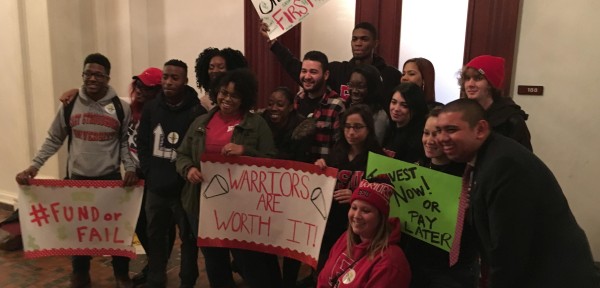

and our students,” said Dr. Ken Mash, President of APSCUF.
ESU students represented our university at the Feb. 8 Harrisburg Fund or Fail Rally.
By Bill Cameron
Managing Editor
Comments made at ESU’s Council of Trustees meeting sparked a debate last week with allegations against a group of university students and faculty.
Pennsylvania Senator and ESU trustee Mario Scavello called attention to the behavior of a group representing the university at a funding rally in Harrisburg earlier this month.
During the public meeting of trustees, Scavello shared an informal complaint he received from a staff member after the group paid an unscheduled visit to his office following the rally.
The email from Scavello’s executive secretary, Dacia Rhoads, claims the ESU group confronted her and other staff members “with an angry tone.”
The message criticized the conduct of both student and faculty visitors, but focused primarily on English professor Dr. Allan Benn.
According to the email, Benn was inciting students “to be angry and argumentative” in negative way against the institution of government; however, this description has itself incited a public argument.
While details of the encounter vary between each party’s accounts, one mutually conceded theme has yet emerged.
“The real story of the day is how great the students were,” said Benn in an interview on Monday.
It would appear that despite conflicting accounts of the events that followed the rally, both involved parties agree on at least one thing: ESU students and their peers made a positive impact that day.
In their independent testimonies, both Scavello and Benn expressed a similar sentiment.
Scavello reached out to The Stroud Courier this Tuesday.
The senator echoed Benn’s praise with his own admiration for those same students.
“It was an honor for me to meet with them,” said Scavello.
He also recalled a favorable impression of the visitors at the time of their encounter, calling the experience with students “very positive.”
The senator said that he only took issue with Benn’s alleged behavior upon receiving Rhoads’ email.
Upon request, Scavello produced a copy of the original message; its contents are available in their entirety on page A2 of this issue.
Other participants in the rally have suggested that the recent controversy has shifted public attention away from the day’s more noteworthy points.
“All of this strikes me as a sideshow,” said APSCUF President Dr. Ken Mash, who spoke to The Stroud Courier on Monday night.
“That rally was really a historic day for our state system, our schools and our students,” said the APSCUF leader.
“The [state] system is great—they do an advocacy day every year—but the number of students that were at the rally, I think that sends a clear message,” said Mash.
“Everyone in the building knew that the students were there, representing their schools.”
Mash and various others delivered speeches throughout the rally.
Speakers included representatives of the teacher’s union, school officials, student leaders and political figures from both major parties.
“This sort of thing just distracts,” said Mash, referring to the senate office claims revealed during the trustees meeting. “It’s unnecessary.”
In addition to attributing greater importance to the rally, some have disputed the staff’s claim of hostility.
The student leaders involved in the office encounter reported a different impression of the visit.
Most recalled little—if any—tension during student and faculty exchanges with the staff.
“We seemed very welcome,” said Layla Irby, the chair of extracurricular affairs in ESU’s student senate.
The president of student senate, Drew Johnson, who spoke directly with the executive secretary, said that Benn’s part was momentary during a brief span of initial uncertainty.
“I think I spoke longer than Dr. Benn did,” said Johnson.
During Monday’s conversation with The Stroud Courier, Scavello clarified previous reports about the rescheduled appointments planned for the time of the student visit. The senator said that the individuals rescheduled their appointments and did not do so by request from office staff.
Both Johnson and Irby said that neither staff nor legislator ever suggested the students should leave.
In fact, Johnson explicitly noted how the senator was charged with a welcoming tone.
“After the tour, he asked for my resume,” said Johnson.
“If he had a problem with us—or Dr. Benn—being there, he certainly didn’t show it.”
He also said that after an announcement about the group departing, the senator offered an unprompted tour of the offices.
Johnson said he and the other students responded with polite appreciation and accepted the offer.
Johnson, Irby and fellow student senator Abigail Soto all described the day’s experience as a productive chance to try to make a difference.
Soto also credited Benn with inspiring her and other students to “take the reins and lead the charge” by having their voices heard at the rally.
While not a former student of Benn’s and with a limited familiarity of the professor, Johnson said he still felt the allegations against Benn seemed unfair.
“I don’t think the venue it was brought up in was appropriate either,” said Johnson.
The student did admit to recognizing a part of what he believed some might have misinterpreted as aggression.
“I would have been intimidated too,” said Johnson.
“I don’t think they were prepared to see all of us—I don’t think the students expected to see that many students that day—but it would be a shame to let this misconstrued event put a bad taste in our mouth.”
“This wasn’t a faculty-run event—no one handed us a sign and said ‘repeat after me’—it was a grassroots campaign started by students,” said Johnson, a claim that Mash verified for the record.
“We walked into that office, and by the end of our productive conversation with the senator, we felt that he was a part of the university’s movement with us,” said Johnson.
“I think it’s everybody’s job to get students our age involved.”
Email Bill at:
wjc1533@live.esu.edu
